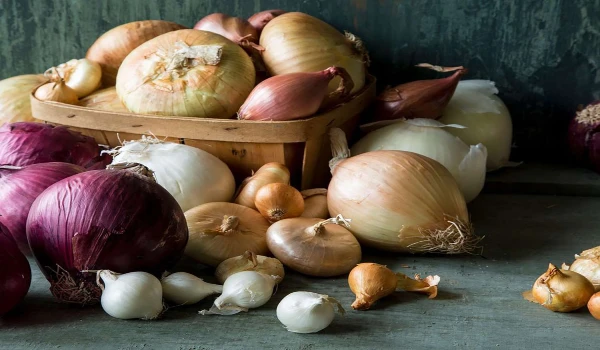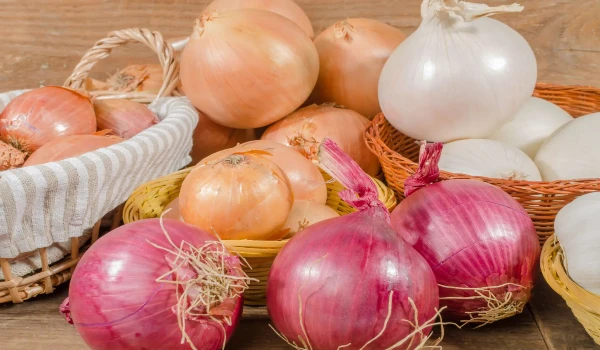Onion benefits, storage method, calories, side effects
Onion nutritional information

| Onion (100g) Nutrition | |||
| carbohydrate | protein | fat | calorie |
| 9.2g | 1.2g | 0.1g | 40kcal |
| Main Nutrition | Dietary fiber, polyphenol, quercetin, selenium | ||
| Main Benefits | Promotes cardiovascular health, improves blood sugar levels, prevents cancer, and strengthens the immune system. | ||
| Side Effects | Excessive intake may cause abdominal pain and diarrhea; ingestion on an empty stomach may cause heartburn and stomach irritation. | ||
Onions come in many sizes, shapes, colors and flavors. The most common types are red, yellow, and white onions. The taste of onions ranges from sweet and juicy to sharp, spicy and spicy, depending on the season in which people grow and consume them. Onions may also offer potential health benefits. These include reducing the risk of several types of cancer, improving mood, and maintaining skin and hair health.
Onion Benefits

1. Heart Health
Onions contain antioxidants and compounds that fight inflammation, reduce triglycerides, and lower cholesterol levels. All of these can lower your risk of heart disease. Onions’ powerful anti-inflammatory properties may also help lower high blood pressure and protect against blood clots. Because quercetin is an anti-inflammatory flavonoid found in high concentrations in onions, it may help reduce heart disease risk factors such as high blood pressure.
2. Improve blood sugar levels
All onion foods, including raw onions, onion juice and extracts, can lower fasting blood sugar in diabetic patients. This is thanks to the antioxidant quercetin, and one study confirmed that to improve blood sugar levels, you need to consistently consume 2 to 3 onions a day.
3. Gastrointestinal health
The fiber in onions promotes good digestion and helps keep you regular. Onions contain a special type of soluble fiber that promotes the growth of good bacteria in the intestines and may help prevent and treat diarrhea. Phytochemicals in onions may reduce the risk of developing stomach ulcers and may help relieve constipation.
4. Joint health
Onions may help prevent age-related osteoporosis, and compounds in onions may reduce bone loss. Additionally, quercetin in onions can inhibit the activity of leukotrienes, prostaglandins, and histamines that cause inflammation in osteoarthritis and rheumatoid arthritis. Onions have a beneficial effect on bone density and also help treat joint pain.
5. Strengthen your immune system
Onions contain selenium, which stimulates immune function. The mineral also prevents excessive immune responses that can cause side effects. When selenium is lacking, immune cells develop and reproduce inefficiently, and these cells have difficulty producing important proteins and transporting calcium. Onions are also used to treat colds and flu, and their anti-inflammatory properties may also help soothe respiratory illnesses.
6. Elder depression relief
Flavonoids, the main component of onions, may help with depression by lowering stress levels. Additionally, caramelized onions have a sweet taste, which may also help with depression.
Storage method
Refrigerated storage method: Refrigerating onions is the most ideal way to store onions. Store in an airtight container or ziplock bag to remove any air. When stored in the refrigerator, the shelf life is up to 2 weeks.
Freezing method: When storing raw or trimmed onions, it is recommended to freeze them. Stored in an airtight container, it can stay fresh for up to 4 months. If it exceeds the expiration date, the exterior may become brittle.
How to store at room temperature: If you do not have refrigerator space, you can store at room temperature. When storing onions at room temperature, they should be stored in a cool, well-ventilated place, away from direct sunlight. It can be stored for up to a week.
Side Effect
- Causes diarrhea and abdominal pain – Onions are spicy and irritating to the stomach. When consumed on an empty stomach, they can damage the stomach and cause symptoms such as heartburn, abdominal pain, and diarrhea.
- Causes constipation – Consuming too much of a high-fiber food can cause symptoms such as constipation and indigestion.
- Kidney strain – Onions are high in potassium, so people with kidney disease should avoid consuming too much.
- Allergic reaction – Depending on your constitution, you may experience an allergic reaction such as skin itching or rash.
- Fart smell – Like cabbage and garlic, onions contain a lot of sulfur, which can make farts smell terrible when consumed.
- Mold – When onions go bad, mold or white water may appear. It is best to discard these onions rather than consume them. Additionally, onions that have been eaten by bugs must be carefully cleaned of their outer skin before using them in cooking.
References
🔹Cleveland Clinic: Stop the Tears: Why Onions Are Good for You
🔹MedicalNewsToday: Onions: Benefits and nutrition
🔹NDTV: 10 Benefits Of Consuming Raw Onion